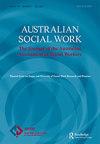支持无家可归的孕妇
IF 2
3区 社会学
Q2 SOCIAL WORK
引用次数: 0
摘要
尽管无家可归的怀孕妇女有很大的需求,但关于这一主题的文献的缺乏导致了对这一弱势群体的实践和政策知识的差距。根据在澳大利亚维多利亚州开展的两个研究项目,作者分析了对无家可归妇女的访谈以及对政策实践者和服务提供者的访谈和焦点小组。探讨了无家可归的怀孕妇女面临的服务系统障碍和稳定住房所需的支持。结果显示,资源枯竭的住房环境,加上限制护理协调和连续性的组织限制,如何对怀孕的无家可归妇女产生排斥的结果。这些发现在女权主义批判社会工作框架的指导下,提请注意以下问题:无视性别的政策和做法的危害;提供有效护理的方法;社会工作需要解决无家可归的孕妇所面临的独特挑战。不承认性别的政策和实践会对无家可归的孕妇产生排他性的结果。迫切需要为无家可归的怀孕妇女提供负担得起的、合适的和长期的住房选择,需要迅速将其安置到永久性住房中,并将怀孕作为满足无家可归的怀孕妇女要求的标准。女权主义批判社会工作方法强调需要为怀孕的无家可归妇女提供持续和协调的护理本文章由计算机程序翻译,如有差异,请以英文原文为准。
Supporting Pregnant Women Experiencing Homelessness
ABSTRACT Despite the significant needs of pregnant homeless women, the paucity of literature on this topic has contributed to a gap in practice and policy knowledge about this vulnerable group. Drawing on two research projects undertaken in Victoria, Australia, the authors analysed interviews with women experiencing homelessness and interviews and focus groups with policy practitioners and service providers. Service system barriers faced by pregnant homeless women and the support needed to stabilise housing were explored. Results showed how the resource-depleted housing context, combined with organisational restrictions that constrained care coordination and continuity, generated exclusionary outcomes for pregnant homeless women. These findings, informed by a feminist critical social work framework, draw attention to: the harms of gender-blind policy and practice; the approaches to providing care that work; and a need within social work to address challenges unique to pregnant women experiencing homelessness. IMPLICATIONS Policy and practice that do not recognise gender generate exclusionary outcomes for pregnant homeless women. There is a pressing need for affordable, suitable and long-term housing options for pregnant homeless women Rapid rehousing into permanent accommodation that recognises pregnancy as a criterion is needed to meet requirements of pregnant homeless women. A feminist critical social work approach highlights the need for continuous and coordinated care provision for pregnant homeless women
求助全文
通过发布文献求助,成功后即可免费获取论文全文。
去求助
来源期刊

Australian Social Work
SOCIAL WORK-
CiteScore
4.20
自引率
16.70%
发文量
37
期刊介绍:
Australian Social Work is an international peer-reviewed journal reflecting current thinking and trends in Social Work. The Journal promotes the development of practice, policy and education, and publishes original research, theoretical papers and critical reviews that build on existing knowledge. The Journal also publishes reviews of relevant professional literature, commentary and analysis of social policies and encourages debate in the form of reader commentary on articles. Australian Social Work has grown out of the Australian context and continues to provide a vehicle for Australian and international authors. The Journal invites submission of papers from authors worldwide and all contributors are encouraged to present their work for an international readership.
 求助内容:
求助内容: 应助结果提醒方式:
应助结果提醒方式:


